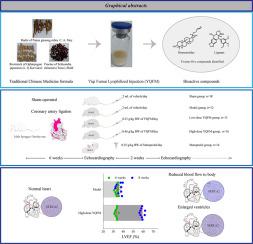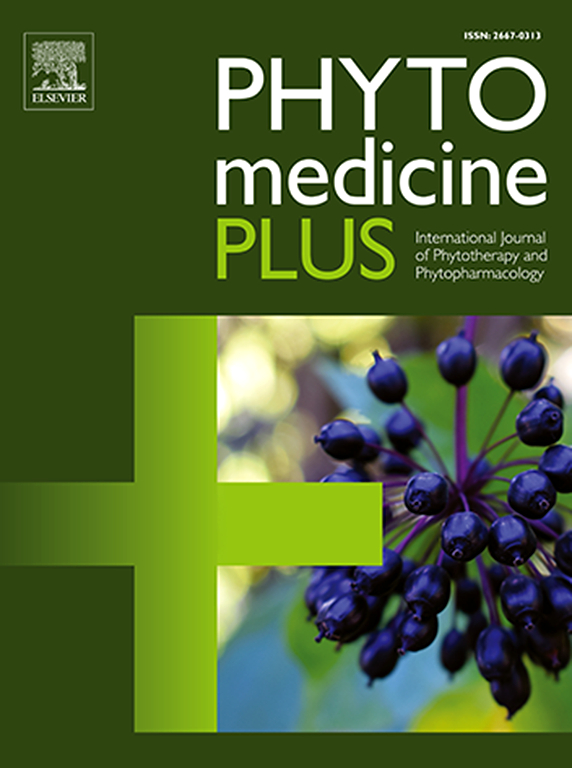Yiqi Fumai Lyophilized injection protects cardiac contractility in a rat model of heart failure with reduced ejection fraction by modulating SERCA2
Q3 Pharmacology, Toxicology and Pharmaceutics
引用次数: 0
Abstract
Background
Yiqi Fumai Lyophilized Injection (YQFM) is a plant-derived preparation that shows protective effects against cardiac dysfunction in both human and animal models. In heart failure (HF), proteins involved in Ca2+ regulation, such as sarcoplasmic/endoplasmic reticulum Ca2+ transporting protein 2 (SERCA2) and cardiac ryanodine receptor 2 (RyR2), are dysfunctional. Compensation for the malfunction of these proteins is considered a practical option for restoring heart function.
Methods
Coronary artery ligation was used to induce heart failure with reduced ejection fraction (HFrEF) in Sprague-Dawley rats. YQFM was administered via intravenous injection for two weeks. Cardiac contractility was evaluated using echocardiography. Hematoxylin and Eosin (H&E) staining, Masson's trichrome staining, western blotting, and immunohistochemical analysis were performed to evaluate myocardial damage and investigate the underlying molecular mechanisms. In vitro, H9C2 cells were subjected to oxygen and glucose deprivation. Western blotting and immunofluorescence staining were used to assess the expression of key Ca2+-handling proteins in the H9C2 cell models.
Results
Twenty-five compounds, mainly ginsenosides, were identified in YQFM. In rats with HFrEF, treatment with YQFM or metoprolol prevents deterioration of cardiac contractility. YQFM caused a patchy delay in the downregulation of SERCA2 in the myocardium, resulting in reduced dilation of the left and right ventricles, thereby preventing left ventricular remodeling. In H9C2 cell models, our results demonstrated that YQFM partially prevented defects in SERCA2.
Conclusion
Our study demonstrated that YQFM may function as a positive cardiac contractility modulator and therapeutic agent for cardiac protection by restoring SERCA2 expression in cardiomyocytes in HF after myocardial infarction (MI).

益气复脉胶囊冻干注射液通过调节 SERCA2 保护射血分数降低的心力衰竭大鼠模型的心脏收缩力
背景益气复脉冻干注射液(YQFM)是一种植物提取制剂,在人类和动物模型中都显示出对心功能障碍的保护作用。在心力衰竭(HF)中,参与 Ca2+ 调节的蛋白质,如肌浆/内质网 Ca2+ 转运蛋白 2(SERCA2)和心脏雷诺丁受体 2(RyR2),会出现功能障碍。方法通过结扎冠状动脉诱导 Sprague-Dawley 大鼠射血分数降低型心力衰竭(HFrEF)。通过静脉注射 YQFM,持续两周。使用超声心动图评估心脏收缩力。进行了苏木精和伊红(H&E)染色、Masson三色染色、Western印迹和免疫组化分析,以评估心肌损伤并研究潜在的分子机制。在体外,对 H9C2 细胞进行氧气和葡萄糖剥夺。结果在 YQFM 中鉴定出 25 种化合物,主要是人参皂甙。用 YQFM 或美托洛尔治疗高频率心衰大鼠,可防止心脏收缩力衰退。YQFM 可使心肌中 SERCA2 的下调发生斑片状延迟,导致左心室和右心室的扩张减少,从而防止左心室重塑。结论我们的研究表明,YQFM 可通过恢复心肌梗死(MI)后高频心肌细胞中 SERCA2 的表达,作为一种积极的心脏收缩力调节剂和心脏保护治疗剂。
本文章由计算机程序翻译,如有差异,请以英文原文为准。
求助全文
约1分钟内获得全文
求助全文
来源期刊

Phytomedicine Plus
Medicine-Complementary and Alternative Medicine
CiteScore
3.70
自引率
0.00%
发文量
178
审稿时长
81 days
期刊介绍:
 求助内容:
求助内容: 应助结果提醒方式:
应助结果提醒方式:


